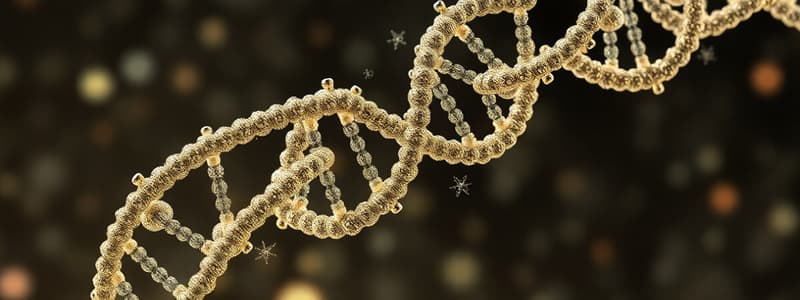Podcast
Questions and Answers
What are the components of a deoxyribonucleotide?
What are the components of a deoxyribonucleotide?
Sugar (deoxyribose), phosphate group, nitrogenous base (e.g., adenine)
Which nitrogenous bases are categorized as purines?
Which nitrogenous bases are categorized as purines?
- Thymine
- Guanine (correct)
- Cytosine
- Adenine (correct)
Thymine is unique to RNA.
Thymine is unique to RNA.
False (B)
What forms the sugar-phosphate backbone in DNA?
What forms the sugar-phosphate backbone in DNA?
What is the structure proposed by Watson and Crick for DNA?
What is the structure proposed by Watson and Crick for DNA?
RNA typically exists as a double-stranded molecule.
RNA typically exists as a double-stranded molecule.
What is the central dogma of molecular biology?
What is the central dogma of molecular biology?
Which of the following enzymes unwinds double-stranded DNA during replication?
Which of the following enzymes unwinds double-stranded DNA during replication?
What characterizes the leading and lagging strands during DNA replication?
What characterizes the leading and lagging strands during DNA replication?
Flashcards are hidden until you start studying
Study Notes
DNA Structure
- DNA is comprised of deoxyribonucleotides, each containing deoxyribose sugar, a phosphate group, and a nitrogenous base.
- Purines include adenine and guanine.
- Pyrimidines include cytosine and thymine.
- Thymine is unique to DNA.
- Phosphodiester bonds form between the 5' carbon of one nucleotide and the 3' carbon of the next, creating a sugar-phosphate backbone.
- The two strands of DNA are antiparallel - they run in opposite directions.
- On the outside of the helix, a sugar-phosphate backbone is present, forming the “rungs” of the DNA helix ladder.
- Hydrogen bonds form between complementary nitrogenous bases on the interior of DNA - adenine pairs with thymine, and cytosine pairs with guanine.
RNA Structure
- RNA contains ribose sugar, a phosphate group, and a nitrogenous base.
- RNA contains uracil in place of thymine.
- RNA is typically single-stranded, but can fold upon itself due to complementary base pairing.
Central Dogma
- DNA encodes messenger RNA (mRNA).
- mRNA encodes protein.
- This process is known as gene expression.
DNA Replication
- DNA replication is the process by which DNA is copied.
- It is semi-conservative, meaning each new DNA molecule contains one original strand and one newly synthesized strand.
Enzymes involved in DNA Replication
- DNA Helicase: Unwinds double-stranded DNA.
- DNA Primase: Synthesizes RNA primer.
- DNA Polymerase: Adds nucleotides to the 3' end of growing DNA strands.
- DNA Ligase: Joins fragments of DNA.
How DNA Elongates
- New nucleotides are added to the existing 3' end of the growing strand.
- Base pairing with the template strand ensures accurate replication.
How Replication Starts
- The replication complex binds at the origin of replication, a specific base sequence.
- Helicase unwinds DNA, and helix-destabilizing proteins help keep strands separated.
- Replication starts at the replication fork.
Leading and Lagging Strands
- The leading strand elongates continuously into the replication fork.
- The lagging strand elongates away from the fork in short fragments called Okazaki fragments.
- RNA primers are laid down on both strands before DNA polymerase can elongate.
Studying That Suits You
Use AI to generate personalized quizzes and flashcards to suit your learning preferences.





